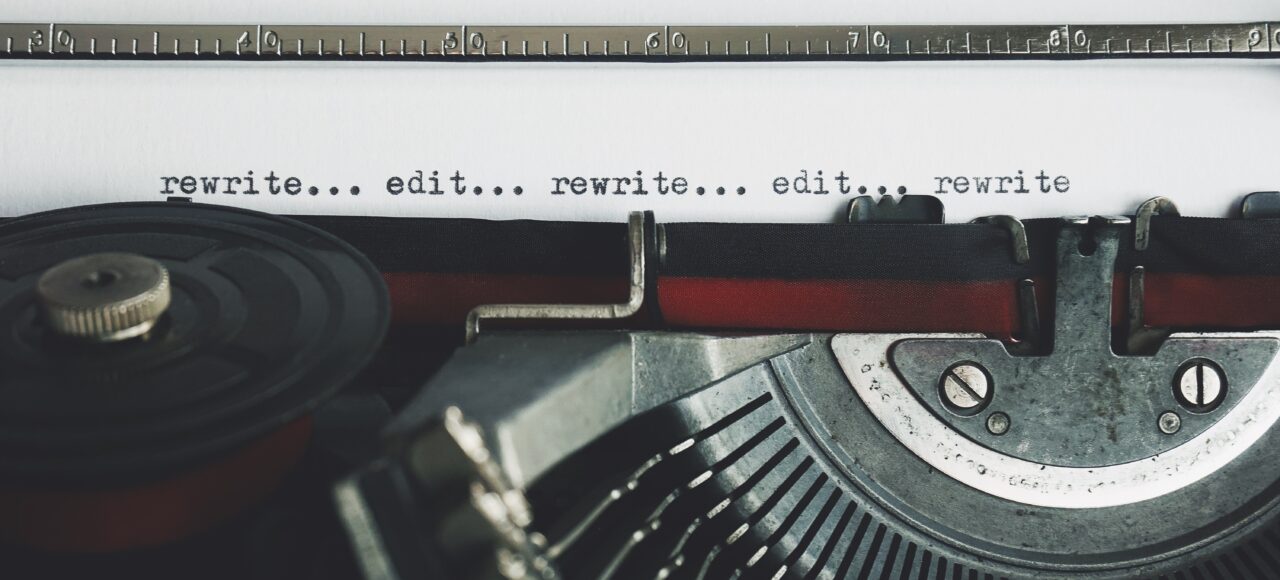
Importance of Editing Your Essay
If you’ve already taken your first English 101 course, you’ve probably had the importance of editing your essay pounded into your head. Most introductory writing courses will involve a lesson or two on proofreading and editing. But do you actually edit your essays before turning them in? If you answered no, you’re not alone. Most students just slam out their papers hours before they’re due and just hope whatever state their first draft is in is good enough for a passing grade. Truly, I did the same thing in undergrad.
While it might temporarily feel good to get a paper done and out of the way, most papers are drastically improved in the drafting stages. You catch typos, poor grammar, and embarrassing misspellings through proofreading. Additionally, most people discover how to deepen their essays, improve their arguments, and even discover new ideas by editing their works. Thus, when you skip the editing stage, your potentially great essays are left with mediocre or failing grades and lackluster content.
Now, if you’re in the “Cs get degrees” mindset, you might not see an issue with this process. But putting little care in your papers does come with possibly long-lasting and serious consequences.
What’s the Worst that Can Happen?
Well, that depends on just what went wrong in your essay. For one, you might have miscalculated how many points you needed to pass, or you may score lower on a later assignment than you anticipated. Retaking classes can often prove costly as it extends the amount of time needed to finish your degree and may not be covered under your funding option.
Low grades aside, you might miss serious issues in your paper such as accidental plagiarism, which can result in expulsion from your program or school. However, that is a more dramatic consequence.
The most common disadvantage is a personal one: you’ll miss out on opportunities, knowledge, and growth. Truly, the value of essays (and why your professors annoyingly hand them out like candy) is that they’re far more effective learning tools than quizzes and tests. A well-written essay requires creativity, analysis, research, and original thought. The writing process helps you develop a deeper understanding of the content, come up with new ideas, and personalize your learning in a way that your professor cannot.
Thus, only creating quickly written, poorly researched, unedited essays can greatly impact your learning long-term.
Not to say that only essay writing alone determines your ability to learn. Some people are not strong writers just the same as some people aren’t good at math. We all have our strengths. However, the essay crafting process strengthens learning more than taking exams. Editing your essay is a part of that process, as it helps even the most seasoned writers spot errors and areas for improvement.

The Do’s of Editing Your Essay
So, what do you do when editing your essay? There is no one correct way to take on this part of the process. There are, however, aspects that you shouldn’t overlook. Many students mistake proofreading (or looking over their paper for typos and mistakes) as editing. Rather, proofreading is a small part of the process. Actual editing looks more at your thesis, arguments, and content quality.
That doesn’t mean you should break every part of your essay apart in search of changing things around. In fact, that’s the exact opposite of what you should do, but we’ll get into that later. When editing, you’re looking to rebuild and/or build upon weak aspects of your essay.
Things that don’t make sense need to be rewritten. Good arguments can be made great. You might discover a source you previously used no longer makes sense and that you need a new one. Your introduction might no longer match the rest of the essay’s content. Or maybe you completely forgot to finish a thought mid-essay and now nothing makes sense.
In my undergrad years, I submitted a paper that was cut off suddenly in the middle of a paragraph due to exhaustion. I just stopped writing and submitted it. It made no sense. And I could have caught it if actually bothered to look back over my essay.
1. Proofreading
The first step of editing your essay should be proofreading. Catch as many of those pesky typos as you can. Missing commas, incorrect words, and misspellings should be fixed in this stage.
Read your paper over as many times as you need until you feel sure that you’ve smashed all of those typos. Then, to be sure, consider using a grammar-check tool. Most programs have one built in at this point. However, do not fully rely on them. Despite upgrades, grammar-checking AI is far from perfect. It will correct words that weren’t wrong and miss glaring mistakes. The tools should be supplemental – you still need to read your own paper again.

2. Clarity
Next, you should ensure that your paper makes sense logically. In other words, does the structure make sense? Does the content make sense? Or are you jumping from topic to topic without any substance in between?
The best method for checking for flow issues is to read your paper out loud. Most individuals are better at catching weird phrasing and poor logic audibly rather than visually.
You may also benefit from asking a friend, colleague, or otherwise trusted person to read your paper for you. Preferably, this individual would not be someone in your class. You want to make sure it makes sense to someone who doesn’t have the exact same knowledge and context as you. Fresh eyes and ears are much better at catching logical fallacies and confusing wording than you, as you know what you wanted to say. If you’re especially worried or want to make sure you’re doing your best, try your college’s reading center. Most schools offer this service as part of your tuition, meaning no extra fee.
Just make sure you can trust this person to be able to catch these errors. As I stated before, not everyone has the same strengths. When editing your essay, remember that not all feedback is created equal.
3. Content
After you’ve taken a look at the technical aspects of your essay, it will be time to take on the actual content. This step of the editing process is far more involved than the first two. If you have time, it’s recommended that you step away from your paper and come back to this stage with a clear head.
Here, you’ll focus on strengthening your thesis and paper as a whole. Look at your paper as a whole first. Does everything make sense together? Does your thesis, your argument, match the rest of the content? For example, if you’re writing a paper on how tree frogs are stealthy, deadly jungle predators, did you explain what makes them so deadly? Or does your paper talk about the various jungle predators? If your content doesn’t match your thesis, but it’s still cohesive, you may just need to change up the thesis.
Similarly, make sure you remove or reword redundant information. If your third paragraph and seventh paragraph could replace each other, you only need one of them. Repeating information for the sake of the word count weakens your essay, argument, and understanding.
It might take you a while to feel confident in the bulk of the content. You might find several things that you want to change, which can feel frustrating and overwhelming. Again, don’t be afraid to take breaks from editing your essay.
4. Citations
Once you’ve finished stage three, you’re going to want to look at your citations. Did you change any sources? Add or remove any? Make sure you make note of these changes. Update your in-text citations, quotation marks, references to authors, and your works cited or reference page. Truly, accidental plagiarism is easy to commit if you’re in a hurry, especially when you’re editing your essay.
Forgetting or misciting your source can decimate your grade, even if your content is high-quality. And, depending on how strict your professor or school is, it can have devastating consequences, up to and including expulsion.

The Don’t’s of Editing Your Essay
Now that we’ve gone over some of the major things you should do when editing your essay, here’s what you need to avoid.
1. Rushing
Above, I mentioned taking breaks to avoid frustration and mistakes and I want to again emphasize its importance. When you rush editing your essay, you run the risk of making more mistakes and causing yourself more problems in the long run. You might only partially edit a paragraph, meaning that the first half no longer matches the second half. As a result, it no longer makes sense. Similarly, you may not finish editing a paragraph or sentence, leaving yourself with run-on sentences or half-finished thoughts.
As we touched on, you could also accidentally commit plagiarism by leaving a quote with no source or an incorrect reference page at the end. Finally, you may also leave typos behind.
Basically, rushing through the editing process means that everything you intended to fix will be in the same or a worse state than before. Instead of ending with a polished final essay, you’ll submit a paper that is more like two essays smashed together.
On a similar note, try to avoid last-second edits, unless it’s something as simple as a typo. If you try to edit at the last minute before your assignment is due, you may accidentally make it worse in a panicked effort to fix it or miss the deadline entirely.
2. Not Looking at Your Essay as a Whole
Another common issue students run into when editing is focusing on the little things. And I don’t just mean typos. Rather, they’ll look at everything on a smaller scale. They’ll line-edit paragraphs without reading the essay through as a whole.
The issue with this technique is that your essay may suffer from structural issues, meaning it no longer logically flows. Each paragraph becomes disjointed and the paper as a whole is disorganized.
When editing your paper, you must edit it as a whole. In other words, don’t just reread paragraphs when editing. Reread the whole essay. Make sure everything makes sense together.
3. Over Editing
When students first start editing, sometimes they take things too far. Draft one will not even closely resemble draft two. Often, this issue comes from a lack of confidence in the first draft. Students will feel that it’s not worth keeping, that it’s horrible, and they’ll effectively write two or more different essays for one assignment.
Now, don’t get me wrong. Sometimes, starting over is necessary. Sometimes, that first paper is just gibberish born from exhaustion, confusion, or misread instructions. But, when you’re editing your essay, you want to build upon the first draft, not delete it entirely. Unless you’re changing your thesis entirely, be kind to yourself in the revision stage. Don’t create more work for yourself when you don’t need to.
Lakewood University
Lakewood University is an accredited online school that offers a variety of degree and certificate programs. We have rolling enrollments and asynchronous courses. In other words, you don’t have to worry about missing a lecture or running late to class. If you plan on enrolling in college while working, Lakewood University offers the flexibility you need to earn your degree.
Don’t hesitate – reach out to our admissions department today to learn more!




